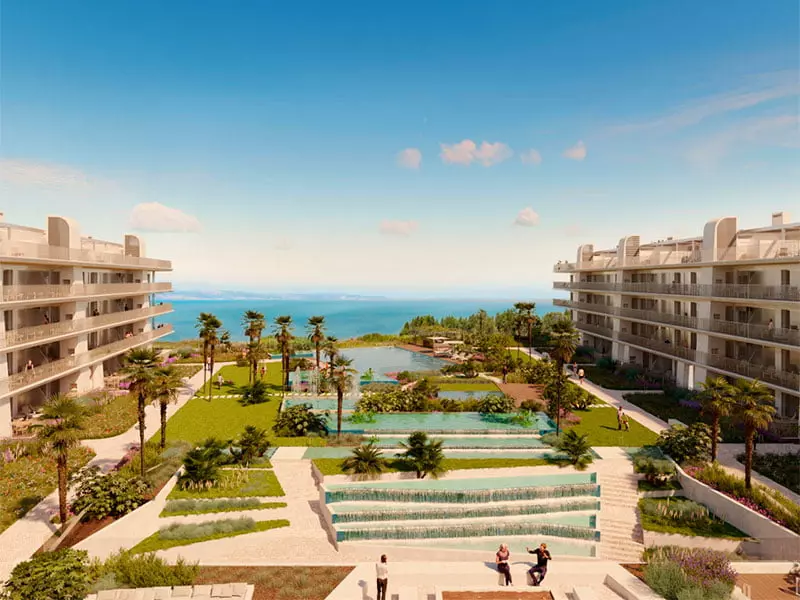 Photo: Upon Bay Mundet, the iconic Mundet factory building over the bay of Seixal, near Lisbon
Photo: Upon Bay Mundet, the iconic Mundet factory building over the bay of Seixal, near Lisbon
Portugal’s real estate market has become a magnet for international investors, thanks to its charming landscapes, favorable climate, and vibrant cultural heritage. In recent years, this market has experienced significant growth, driven by factors such as economic stability and attractive residency programs. This article provides a deep dive into the current trends, price ranges, and property types available in Portugal, with a special focus on key regions like Lisbon, Porto, and the Algarve. Whether you're a seasoned investor or someone looking to enter the real estate market for the first time, this guide will equip you with essential insights to navigate Portugal's dynamic market.
The Allure of Portugal’s Real Estate
Portugal stands out in the global real estate landscape due to its unique combination of lifestyle, fiscal benefits, and investment opportunities. The country's blend of historical charm and modern innovation has attracted global investors, offering diverse opportunities across various regions. The real estate market has flourished as a result, with a rise in demand for both residential and commercial properties. The high-quality lifestyle, affordable living costs, and safe environment add to its allure as an investment destination.
Political Stability and Legal Framework
Portugal's political stability and transparent legal system provide a secure environment for real estate investments. Investor-friendly policies, including residency programs and tax incentives, have been instrumental in attracting foreign investors. To navigate the market successfully, it's crucial for investors to understand the legalities of property acquisition, such as registration processes and property rights.
Economic Factors
The Portuguese economy, characterized by steady growth and a strong tourism sector, underpins the strength of the real estate market. Foreign investment and increased property demand have led to healthy appreciation of real estate values, particularly in prime locations. Let's explore some economic trends, including property prices, rental yields, and market predictions.
1. Market Performance
The Portuguese housing market remains healthy and robust, with a continuous increase in property demand and strong residential construction activity. The market had a strong performance in 2022, driven by high demand and low supply, and this trend is continuing into 2023.
2. Sales Transactions
2023 is expected to be a record-breaking year in terms of sales transactions, with approximately 168,000 units estimated to be sold, totaling a sales volume of €30-31 billion.
3. House Price Index
The Portugal Residential House Price Index is expected to average around 190.98 points in 2023 and 193.27 points in 2024, indicating a steady increase in property prices over these years.
4. Rental Market
Investing in rental properties in Portugal is a wise decision due to higher demand compared to the available supply, especially in key areas like Lisbon and Porto. In the Great Porto Area, the average increase in rental values was about 7.06 €/m2. Notably, municipalities such as Cascais, Lisbon, Oeiras, and Porto experienced higher year-on-year rental growth compared to the rest of the country.
5. Real Estate Prices
Despite challenges such as the war in Ukraine, high inflation, and rising mortgage interest rates, the residential real estate market in Portugal remained resilient throughout 2022. In Lisbon, for instance, the average price per square meter in April 2023 was 4,605 euros, indicating an increase of 1.95% compared to February 2023 and 15.5% compared to April 2022.
6. Trends and Foreign Investment
Property renovations and continued foreign investment are two significant trends shaping the market in 2023. These trends highlight the market's adaptability to evolving demands and the significant role of foreign capital in the real estate sector.
Overall, the Portuguese real estate market shows signs of robust growth and resilience, with healthy demand and a promising outlook for property sales and rentals.
Social and Demographic Trends
Portugal's diverse population, including a growing expatriate community and increasing retirees, significantly influences the real estate market. Urban areas, with their vibrant cultural scenes and amenities, attract a younger demographic, while the Algarve is a preferred choice for retirees. The social fabric of Portugal, with its focus on quality of life, plays a vital role in shaping real estate preferences.
Technological Advancements
Technology integration in the real estate sector, from online property listings to virtual tours, has revolutionized property buying and selling. Portugal's growing tech industry, particularly in cities like Lisbon and Porto, is influencing the real estate market, with a surge in demand for modern, tech-enabled properties.
Environmental Considerations
Portugal's commitment to environmental sustainability impacts real estate development. The trend towards eco-friendly constructions and renewable energy sources is evident, with a growing number of properties featuring sustainable designs and energy-efficient technologies.
 Unique Tagus Alcochete, near Lisbon
Unique Tagus Alcochete, near Lisbon
Regional Market Analysis
Across Portugal, the Algarve was the most expensive region to buy a house in the second quarter of 2022, with an average cost of 287,482 euros, followed by the Metropolitan Area of Lisbon at 260,754 euros. The cheapest regions were Alentejo and the Central regions. House prices rose in all regions compared to the second quarter of 2021, with the most significant increases in the Autonomous Region of Madeira (+21%), the Algarve (+20%), and the Azores (+19%). Comparing current prices with those before the pandemic, the Madeira region experienced the highest rise (49%), followed by the Algarve (45%), and Lisbon (32%). Porto also saw a significant increase of 31%.
Lisbon
Lisbon, the charismatic capital, is at the forefront of Portugal's real estate boom. The city offers a variety of property types, from luxury apartments to historic villas. Prices vary widely, but the demand for centrally located properties has led to significant appreciation in recent years. Investors are particularly attracted to Lisbon for its robust rental market, fueled by tourism and a growing expat community. On the outskirts of Lisbon, excellent investment opportunities in Seixal and Alcochete, on the south bank of the Tagus River, should not be overlooked.
Porto
Porto's real estate market, though smaller than Lisbon's, is equally dynamic. The city is known for its cultural richness and burgeoning tech scene, which has attracted a younger demographic. Property prices in Porto are generally more affordable than in Lisbon, offering attractive opportunities for investors seeking value for money.
Algarve
The Algarve region is renowned for its stunning coastline and is a popular destination for retirees and holidaymakers. The real estate market here is diverse, ranging from luxury seafront villas to traditional townhouses. While prices are higher in tourist hotspots, the Algarve offers good value in its less explored areas.
Market Dynamics and Trends
This section provides a detailed analysis of current market trends, including the increasing interest in rural properties post-pandemic and the demand for luxury accommodations. It also discusses the impact of global events on the Portuguese real estate market and offers predictions for future trends. The Portuguese real estate market is characterized by a blend of urban and rural properties, catering to a range of preferences. The market has seen a surge in demand for new construction, but there is also significant interest in renovated historical properties. The COVID-19 pandemic brought temporary shifts, with increased interest in spacious, remote properties. Looking ahead, the market is expected to remain robust, driven by ongoing foreign investment and steady domestic demand.
Investing in Portugal: What Foreigners Need to Know
Foreign investors need to navigate a series of steps and considerations when investing in Portugal. This comprehensive guide covers legal requirements, tax implications, and practical tips for successful investment, including insights into the mortgage process for non-residents and the importance of local market knowledge. The Portuguese market is relatively accessible for foreign investors, but understanding the legal and regulatory framework is crucial. The process involves obtaining a fiscal number, opening a local bank account, and understanding the implications of property taxes. Seeking local legal counsel is advisable to navigate these processes effectively. Potential investors should also be aware of market nuances, such as the importance of location and the potential for property value appreciation.
The Portuguese real estate market offers a compelling mix of opportunities for international investors. With its diverse range of properties, stable market dynamics, and attractive investment incentives, Portugal stands out as a prime location for real estate investment. As the market continues to evolve, it presents both challenges and opportunities. However, for those willing to navigate its complexities, the rewards can be substantial. The market's diversity, growth potential, and favorable investment climate position Portugal as an attractive real estate destination in 2024 and beyond.
In summary, the Portuguese real estate market demonstrates strong growth potential and resilience, with regional variations in price trends. The Porto region, in particular, has shown a consistent increase in selling prices, with specific areas like Trofa and Penafiel experiencing notable growth. Nationally, the Algarve and Lisbon remain the most expensive regions, while Madeira has shown the highest price rise since the pandemic.
Sources:
- CBRE Portugal Market Outlook 2023
- Idealista - Property for Sale in Portugal
- Global Property Guide - Portugal Price History
- The Portugal News - Portugal Real Estate Market Update 2023
- Pearls of Portugal - Real Estate Trends in Portugal for 2023
- Idealista - Portugal Property Market Outlook 2023
- WithPortugal - Porto Imovel Inverno 2023











